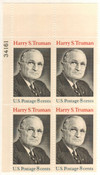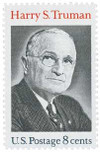
# 1499 - 1973 8c Harry S. Truman
Truman Doctrine
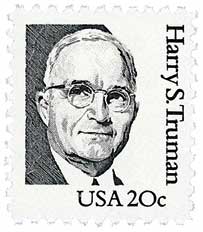
On March 12, 1947, President Harry S. Truman introduced his Truman Doctrine, a foreign policy aimed at reducing Soviet expansion during the Cold War.
The doctrine came as a result of a pair of crises in Turkey and Greece. In the wake of World War II, the Soviets had pressured Turkey to allow Russian shipping to pass freely through the Turkish Straights. When Turkey refused, tensions rose in the UK and later the US provided economic and military aid.
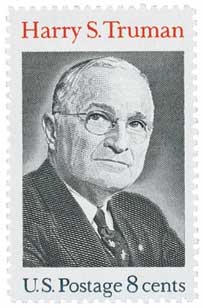
During this same period, Greece was in the middle of a civil war between the Greek Communist Party and the Greek royalist government. Britain had provided aid to Greece but in late 1946, they told American officials they could no longer help because of their own weakened economy.
By early 1947, Truman’s administration recognized that if Greece fell to Communism, Turkey likely would too. So the American government decided to provide equal aid to both Turkey and Greece, in the hopes it would also help to relieve the long-standing tensions between the two nations as well.
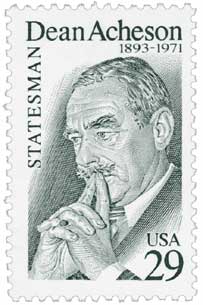
Truman would need the support of both houses of the Republican Congress to pass legislation, so he met with key congressional leaders to explain the seriousness of the situation. Undersecretary Dean Acheson explained that the spread of communism was like a rotten apple that could quickly spread its infection to an entire barrel. His rhetoric impressed chief Republican spokesperson Senator Arthur H. Vandenberg, who encouraged Truman to address Congress and “scare the hell out of the American people.”
The situation grew dire, as on March 7, Acheson told the president that he feared Greece might fall within weeks if they didn’t soon receive aid. So Truman and Acheson worked together to craft the Truman Doctrine. On March 12, 1947, the president delivered his 18-minute speech before a joint session of Congress. In it, he stated, “it must be the policy of the United States to support free people who are resisting attempted subjugation by armed minorities or by outside pressures.”

In general, Truman’s speech was well received and his proposal was approved in May by a large majority, granting $400 million in military and economic aid to Greece and Turkey. By 1948, the Greek Communist threat was defeated.
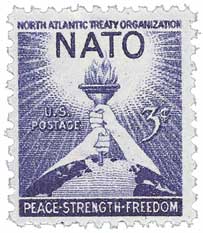
The doctrine would have even longer-lasting effects. It established America’s Cold War policy and was one of the stepping-stones to the creation of NATO.
Click here to read the full text of the Truman Doctrine.
Click here to see what else happened on This Day in History.
Truman Doctrine

On March 12, 1947, President Harry S. Truman introduced his Truman Doctrine, a foreign policy aimed at reducing Soviet expansion during the Cold War.
The doctrine came as a result of a pair of crises in Turkey and Greece. In the wake of World War II, the Soviets had pressured Turkey to allow Russian shipping to pass freely through the Turkish Straights. When Turkey refused, tensions rose in the UK and later the US provided economic and military aid.

During this same period, Greece was in the middle of a civil war between the Greek Communist Party and the Greek royalist government. Britain had provided aid to Greece but in late 1946, they told American officials they could no longer help because of their own weakened economy.
By early 1947, Truman’s administration recognized that if Greece fell to Communism, Turkey likely would too. So the American government decided to provide equal aid to both Turkey and Greece, in the hopes it would also help to relieve the long-standing tensions between the two nations as well.

Truman would need the support of both houses of the Republican Congress to pass legislation, so he met with key congressional leaders to explain the seriousness of the situation. Undersecretary Dean Acheson explained that the spread of communism was like a rotten apple that could quickly spread its infection to an entire barrel. His rhetoric impressed chief Republican spokesperson Senator Arthur H. Vandenberg, who encouraged Truman to address Congress and “scare the hell out of the American people.”
The situation grew dire, as on March 7, Acheson told the president that he feared Greece might fall within weeks if they didn’t soon receive aid. So Truman and Acheson worked together to craft the Truman Doctrine. On March 12, 1947, the president delivered his 18-minute speech before a joint session of Congress. In it, he stated, “it must be the policy of the United States to support free people who are resisting attempted subjugation by armed minorities or by outside pressures.”

In general, Truman’s speech was well received and his proposal was approved in May by a large majority, granting $400 million in military and economic aid to Greece and Turkey. By 1948, the Greek Communist threat was defeated.

The doctrine would have even longer-lasting effects. It established America’s Cold War policy and was one of the stepping-stones to the creation of NATO.
Click here to read the full text of the Truman Doctrine.
Click here to see what else happened on This Day in History.






